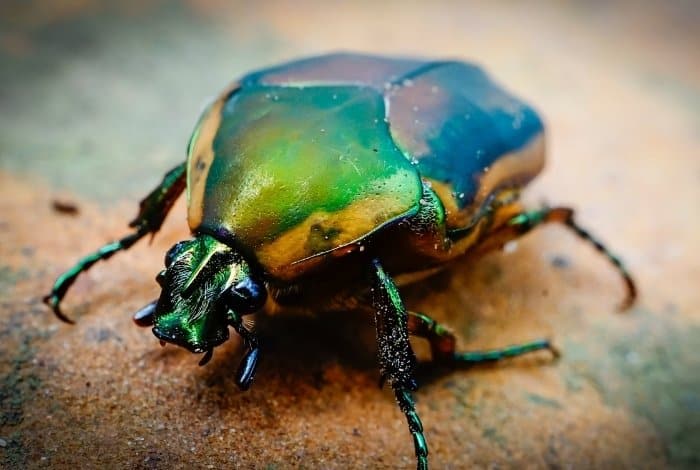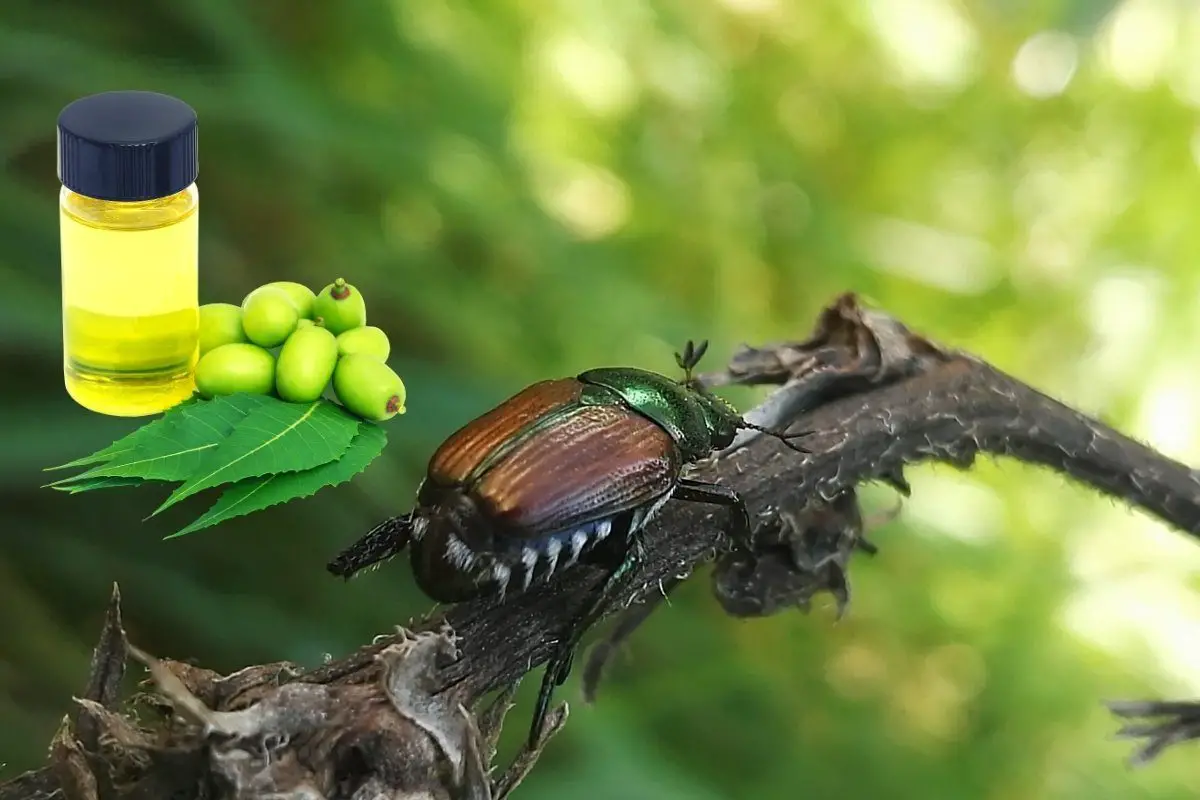Last Updated on March 27, 2022 by Fabiola L.
When searching for a safe and effective means to control disease and insects in your lawn, many gardeners wonder does neem oil kill Japanese Beetles effectively?
Neem oil is a natural byproduct of the neem tree. It is harvested from the trees’ leaves and seeds. It has been used as a natural pesticide for hundreds of years and still works today.
You can find Neem oil products in use in homes in the form of soaps, cosmetics, toothpaste, and dog shampoo.
What are Japanese Beetles?
Japanese beetles are beautiful roughly ¼ inches wide and 3/8 inches long. They have a beautiful shiny, metallic green bodies and copper-colored wings.

The damage caused by Japanese beetle is easy to identify from the others. The telltale signs include skeleton leaves or total defoliation. It is easy to catch them in the act as they love to eat rosebuds from the inside out.
Why Use Neem Oil to Kill Japanese Beetles
Neem oil not only stops Japanese beetles in the middle of their feeding frenzy. But it also controls other harmful insects. They include: aphids, sawflies, sawfly larvae, adelgids, cabbage loopers, wooly adelgids, lace bugs, cabbageworm, scale, chinch bugs, leafhoppers, spider mites, mealybugs, flea beetles, crickets, mole crickets, squash bugs, pear slugs, earwigs, tent caterpillars, grasshoppers, rust mites, thrips, green stink bugs, whiteflies, pear psyllas, gypsy moth caterpillars, rose slugs harlequin bugs and other soft-bodied insects.
Neem is also used to prevent diseases that affect roses. These diseases like rust, powdery mildew, black spot, anthracnose, and scab are treated using a Neem formulation called Rose RX.
Neem oil-based sprays control Japanese beetles’ outbreaks. Even if you use milky spore and beneficial nematodes, the beetles will still affect your crops.
Neem Organics Pure Neem Oil | Neem Oil Spray for Plants
Read more about How to Get Rid of Alphids
Application of Neem oil immediately beetles are spotted helps diminish feeding. Apply for 7 days when the beetles are feeding to stop them in their tracks. To prevent leaf burn, and avoid hurting other helpful insects like honeybees, spray the Neem oil late in the evening.
Neem oil and sprays containing potassium bicarbonate are highly effective, especially on roses.
Note that neem can be harmful to fish and other aquatic life. As a caution, do not use it near rivers, lakes, and ponds. Apply it again after the rains have poured because it’s washed away.
Does Neem Oil Kill Japanese Beetles?
No, Neem oil does not kill Japanese beetles! There are plenty of products you can apply to your garden or lawn to help fight off Japanese beetles. Even though insecticides are effective, Neem oil is mostly preferred because it deters them from feeding.
Not only does Neem oil deter the beetles from eating your plants, but it also harms them if they eat them. If the Japanese beetles ingest the Neem oil, they will pass it down to the eggs which prevents them from hatching. This way you protect your garden and control the Japanese beetle population which is a win-win situation.
When you apply Neem oil to the soil early enough, it eliminates the grubs – beetle’s eggs. Japanese beetles lay their eggs in the soil and once they hatch you notice the beetles squirming around.
Conclusion
Even as you use Neem oil to deter the beetles, you can consider growing beetle deterring plants. Beetles are drawn to more than 300 plants. Some common ones include:
- Rose bushes
- Birch trees
- Crape myrtle trees
- Linden trees
- Crabapple trees
- Fruit trees like peach, plum, cherry, apply, apricot
- Pansies
- Dogwood trees
- Poppies
- Chrysanthemums
- Pansies
- Lilac trees
- Begonias
You can win the beetles war if you use the right tools for this kind of battle. These nasty beetles must be deterred by all means!
FAQs
How do you use neem oil for Japanese beetles?
Neem oil can be used to control Japanese beetles. It is a natural insecticide that has the ability to kill adult Japanese beetles, larvae, and eggs. It is mostly used in gardens, but it also works well for controlling other pests in the home. Japanese beetles which are found on most fruits and vegetables can be controlled with this.
Neem oil is an organic pest control that is made of seeds, leaves, and bark of the neem tree. It is a mixture of three different oils extracted from the Indian neem tree: sesame oil, coconut oil and jojoba oil. It is safe for humans and animals as long as it's not ingested.
You will want to make sure that the area you're spraying has been degreased and dried before you attempt to treat it with neem oil. It’s best to spray in the early evening when the temperature is highest, because if your area is sprayed when temperatures are too cold, then you might end up killing off plants that are already trying to grow from winter dormancy.
When you have an infestation, the best time to spray them with this oil is when they are feeding on flowering plants such as roses or lilacs. The oil will not be able to penetrate the waxy coating of the beetle and will cause it to suffocate if it gets too close.
How long does it take neem oil to kill Japanese beetles?
It contains two different active ingredients, azadirachtin and neem extract. These two ingredients are toxic to Japanese beetles, but the duration of their effects vary depending on the exposure level. The oil is made with neem tree extract, which has been in use since ancient times. The oil works by damaging the respiratory system of the insect.
Neem oil can kill Japanese beetles in as little as one hour if they are exposed to high concentrations of it, but it takes time for the treatment to work fully. The insects may die within minutes and larvae may take up to two hours before they die.
How often should you spray neem oil for Japanese beetles?
There are many variables that you need to take into account when determining how often you should spray neem oil for Japanese beetles. These variables include the size of your garden, how many Japanese beetles there are in your garden and what type of plants these bugs are on.
The duration and frequency of spraying neem oils should also depend on how much damage the Japanese beetle has done in the garden. The spray should be applied two times a week if the Japanese beetle is still present, but only once a week if there is no evidence of damage.
Neem oil sprays kill adult Japanese beetles but it kills the larvae too. If you have Japanese beetle larvae, you need to spray when they hatch.
Find more information about Why Neem Oil For Tomato Plants Is The Best Organic Fertilizer – Find Out With These 5 Amazing Tips
Caroline is a gardener who loves to get down to the nitty–gritty of gardening. She proudly proclaims herself as a ‘dirt worshipper‘ and can often be found deep in the garden, covered in soil and singing to her plants. As a self–proclaimed ‘plant whisperer‘, Caroline believes that plants need love and attention just like any other living thing, and she loves to give them both. When she‘s not tending to her garden, you can often find her researching the latest gardening trends, or teaching others how to make their gardens thrive



